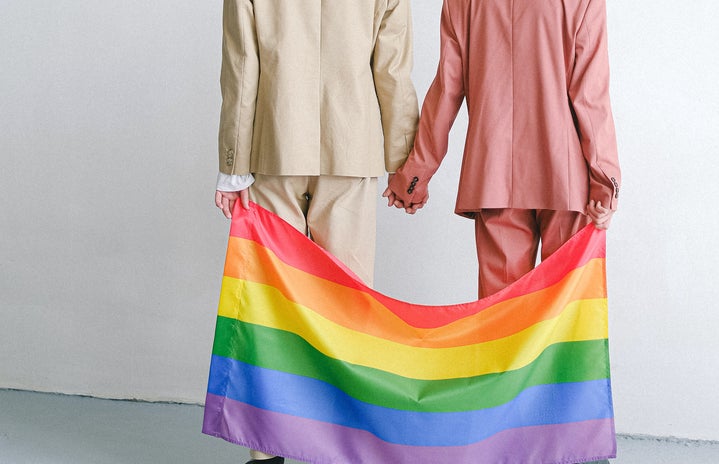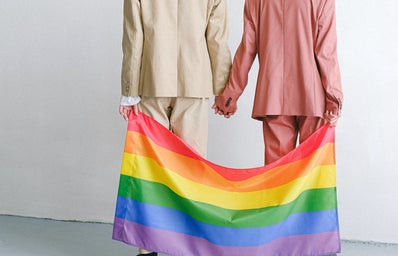Every year, in the weeks leading up to Valentine’s Day, I’d see commercials and endless movie channel queues – all showing different versions of the same love story. A boy and a girl meet, have some obstacles in their shared way and then after a great revelation, reconcile via a magical and public grand gesture. I’d hear the word ‘gay’ or ‘homo’ occasionally sprinkled in, usually as slurs or anomalies and the one time I said these words out loud I was quickly silenced. So, I thought it was something illicit or illegal – like murder, the other ‘no-no’ word.
The first time I saw two girls kissing, I was nine and was surrounded by assorted pre-teen classmates. The general consensus was that of shock and mild disgust and so, eager to fit in, I agreed, tucking my questions into the back of my mind. It wasn’t till I was well into my teens that I realized that that there was something beyond ‘lesbian’ tags scrawled on bathroom walls and boy-meets-girl scenarios when it came to relationships.
The inherent heteronormative structure of our society is so deeply ingrained in us at such an early age that it forces every queer individual to bury an instrumental part of themselves and critically damage the paradigm of queer relationships. There is no ‘man of the relationship’ in all relationships, simply because all relationships don’t adhere to the binary concept of gender roles.
Almost all first and teen relationships tend to have an unstable streak simply because the participants are only just coming into themselves- but the disparity between the obstacles faced by hetero and homosexual people is so large that it forces young people to deal with situations much larger than they can handle and should be faced with.
My fears starting a relationship weren’t that my parents would be critical of my partner or that of any potential red flags pointed out to me by my friends. They were more concerned with the fear that if anyone finds out, friend or family, they would be repulsed by the very nature of my being. There was no best friend for me to go running to after a fight and no awkward-first meeting of the parents because the entirety of my relationship was confined to a fragile bubble that threatened to burst with the tiniest of slip ups. All the things we felt or said -good, bad or ugly- just ricocheted between us.
I wasn’t ecstatic when Article 377 was decriminalized because as a queer teenager the legality didn’t come into play at all. The actual barriers in my way were the people around me -judgemental age-mates who didn’t know any better and adults who chose not to not to budge from their old notions. So when I first kissed a girl, my immediate reaction was ‘I hope no one saw me’ because I didn’t want to be the one scorned and shunned by anyone who might be watching. All my excitement and bubbliness was dampened by the in-built crushing anxiety of being different, an outsider.
We joke about queer people falling in love with each other too fast but my theory is that when the costs of reaching that point and the stakes of remaining there are so high, every moment becomes stolen and expensive, so much so that the participants feel almost incumbent to accelerate the process. At sixteen I made promises that engaged adults balk at within weeks because if I was risking all my friends and my family to be in this relationship, surely my partner was worth that step. The issue that arose was that while my partner was definitely worth all the love and attention I was giving, I shouldn’t have felt the necessity to exaggerate my capabilities just because of a society designed to trip us.
I lost several friends, some I could win back, some I couldn’t. All because I had a potentially life-altering secret. In the fear of possibly losing them to homophobia I lost them to neglect and so, in the darkest months of my life post my first break-up ,I was alone. We always hear people saying how high-school puppy love rarely ever survives the transition to adulthood and we, being rational of course agree, right up until we fall in love and convince ourselves that we’re the exception. I wouldn’t ever take back all the love I gave and all the chances I took but I wish that it hadn’t been so hard and complicated because I shouldn’t have had to hurt so much just to tailor myself to fit the rigid cut-out I’d been provided.
When I finally did come out to the closest of my friends, they were almost offended that I thought they may act negatively. And while I always knew that they were good people, allies even, I couldn’t bear to see the look on their faces if this wasn’t that they wanted or expected from me. You can’t ever take back coming out and it’s never easy, no matter how long you’ve known the person or how well you know they’re going to react. It’s even harder when your partner still wants to remain closeted because morbid curiosity urges the listener to dig deeper and get to the ‘illicit’ details.
It was freeing knowing that people saw me and loved me still, that I could discover and rediscover facets of myself without losing my people. Being queer was never a choice but it’s something I willingly embrace now because nobody who thinks ‘all I am is who I love’ is worth having in my life.
There are some days I wish I didn’t have to deal with the complications of being a queer teenager in a homophobic country and others wherein I feel like telling every stranger I encounter about this alive, exciting part of who I am. To every queer person still trying to find the courage to come out or struggling with backlash from the people around you, fighting to keep relationships with self-destruct buttons built in afloat, it gets better.


